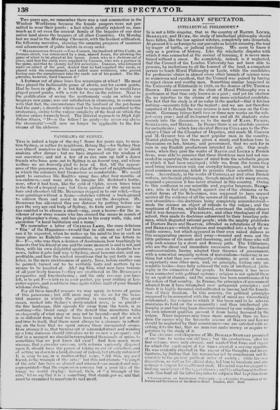PANORAMA OF SYDNEY.
This is indeed a topic of the day! Some few years ago, to men- tion Sydney, or rather its neighbour, Botany Bay—for Sydney then was almost nameless in this country, was as vulgar as to drink madeira after dinner ; but we have improved on the wisdom of our ancestors ; and not a few of us can sum up half a dozen friends who have gone out to Sydney in an honest way, and whose welfare we are honestly glad to hear of. But, till the appear- ance of this panorama, we had no idea of the sort of neighbourhood in which the colonists find themselves so comfortable. We could paint to ourselves Mr. Smith's smug face after four months of sea-sickness,—and were able to imagine Mr. Redstart's bottle- nose, after it had been, like the gold of Ophir, seven times tried in the fire of a tropical sun ; but these pictures of the mind were bare and cheerless till Mr. BURFORD stepped in to our relief,—they were paintings without a frame—sketches without a back-ground to enliven them and assist in making out the deception. Mr. BURFORD has alleviated this our distress by putting before our eyes the very age and body of Sydney, its form and pressure : he has enabled us to choose a street—nay, even a house—for the re- sidence of our stray cousin who has crossed the ocean in search of the philosopher's stone, and has given to his every walk, ride, and excursion "a local habitation and a name."
We remember a letter of CHARLES LAMB, the once delicious " Elia" of the Magazines—(would that he still were so ! but how can it be expected, when he makes up his mind to live in such an inane place as Enfield)—we remember, in one of his letters to B— F—, who was then a denizen of Australasia, how touchingly he laments that his friend at one and the same moment is and is not, and then, with his own delightful quaintness, goes on to describe how news, before it gets half way to Sydney, must become stale and un- profitable, and how the wicked inventions that he put forth in one letter, in the mere recklessness of gaiety, have, before another can be penned, turned out to be veritable facts and matters by no means to be laughed at. Ah ! my Elia, what now have become of all your lively fancies ?—they are smothered in Mr. BURFORD 'S perspective and foreshortening ; and the only revenge you have left, is to put F—'s letters in your pocket, pay your shilling at Lei- cester-square, and read them once again within sight of your friend's whilome dwelling.
For all these fanciful reasons we may speak in terms of praise of this panorama ; but still more may we do so for the beau- tiful manner in which the painting is executed. The great ocean, nooked into Sydney's many-angled cove, is so placid— the fine landscape, that spreads far away from the town, is so soothing—the broad range of the distant blue mountains talks so eloquently of what may or may not be beyond—and the whole is so different from what we have been used to, and yet so real and true to itself, that there must always be a pleasure in reflect- ing on the hour that we spent among these unexpected scenes. How strange it is, that turning out of a crowded street and winding up a long staircase should introduce us to so new a prospect ; and that in a moment we should be transplanted thousands of miles, to something that we just knew did exist ! And how much more strange, that a circular canvass, with colours variously disposed upon it, should have the power of taking us out of ourselves, and of setting us down in a land, dreamt, of indeed, but utterly unknown! It is easy to sa',', in a matter-of-fact voice, "All this, my good friend, is the triumph of the arts ;" but this unfortunate "triumph of the arts" has been so abused and misused—so mauled and mis- appropriated—that the expression conveys but a poor idea of the image we would display : instead, then, of " a triumph of the arts," let us say that it is a something that stands per se, and that must be examined to ascertain its real merit.


















 Previous page
Previous page